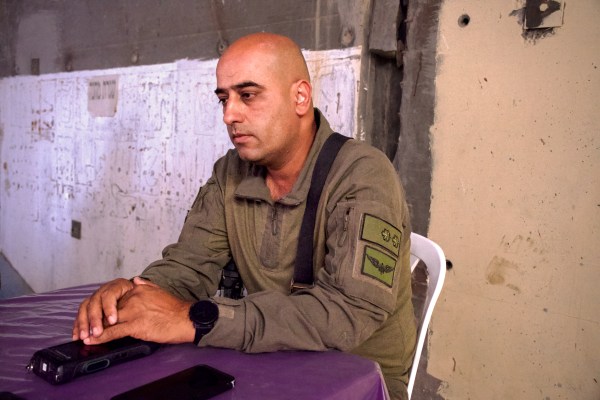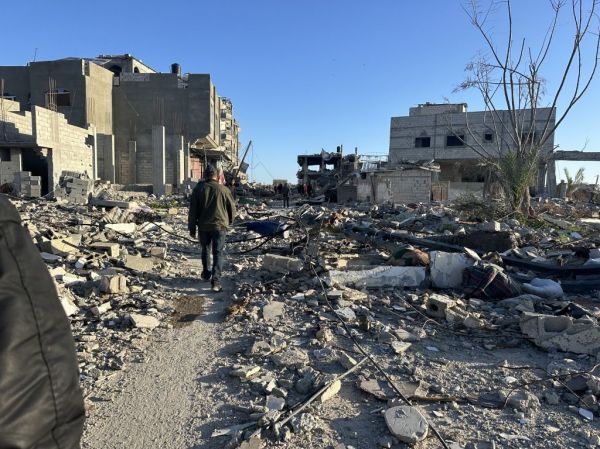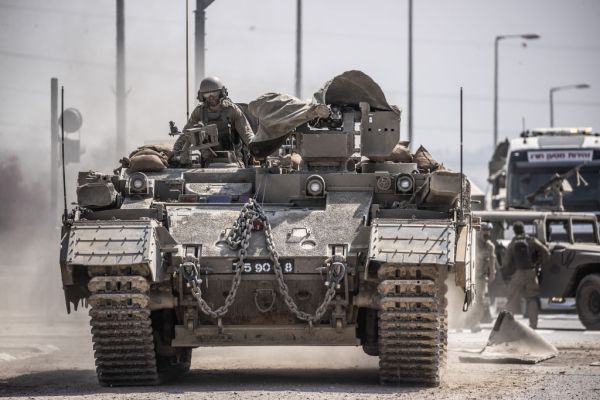Since the start of the Israel-Hamas War, the governments of Israel and the United States have disagreed about who should run security in the Gaza Strip after hostilities calm down. President Joe Biden and Secretary of State Antony Blinken want a multinational force without a substantial Israeli military presence. Prime Minister Benjamin Netanyahu insists that, whoever is tasked with street-level law and order, the Israeli Defense Forces will remain the predominant power inside Gaza.
Netanyahu is applying a lesson Israelis have learned since the October 7 massacre: only the IDF can guarantee the security of Israeli civilians, precluding the need for destructive operations like Israel’s current campaign against Hamas.
Compare Israel’s post-October 7 behavior in two Palestinian enclaves: the Gaza Strip and the West Bank. Gaza’s awful trajectory began in 2005, when Israeli Prime Minister Ariel Sharon withdrew the IDF and all Israeli civilians (about 8,000 people), turning over the strip to the Palestinian Authority. Hamas violently evicted the PA in 2007, introducing Islamist rule to 1.4 million Gazans and thousands of rockets to Israel’s south. The IDF’s absence permitted Hamas to recruit, to build an elaborate command structure and a huge tunnel network, and to plan operations like the October 7 massacre itself.
Since Israel withdrew in 2005, Gazans have endured two decades of fanatical rule. They are now suffering from a war that Hamas began by killing 1,200 Israelis. What ails Gaza is not a lack of autonomy or even a government without popular legitimacy––Hamas received a majority of seats in the 2006 parliamentary elections, and most Gazans still support the October 7th massacre. The basic problem is misrule by a terror group too long unresisted by the IDF.
The West Bank since October 7 is altogether different. Although Israel has fought terrorist cells in the northern cities of Jenin, Tulkarm, and Nablus, nothing like Gaza-grade destruction has been visited upon West Bank Palestinians. West Bank terrorism is simply less threatening to Israelis, because over two decades of ongoing Israeli operations before October 7—sometimes assisted and sometimes opposed by Hamas’s rivals in the Palestinian Authority—have kept terror networks from forming.
The origins of Israel’s current West Bank policy are instructively similar to those that now lead the Netanyahu government to want the IDF to predominate in Gaza. During 1993-1996, as the Palestinian Authority created by the Oslo Accords assumed responsibility for Palestinians in the West Bank, the annual Israeli death rate from terrorism tripled. Twice at the end of the Clinton administration, Israeli Prime Minister Ehud Barak offered PA chief Yasser Arafat a Palestinian state on nearly all the West Bank. Arafat said no, and launched a terror war––the Second Intifada––that killed more than 600 Israelis during 2001 and 2002.
Israeli deaths from West Bank terror subsided with Israel’s Operation Defensive Shield in the spring of 2002, and Israel’s military and intelligence operations throughout the West Bank have kept terrorism low ever since. The Palestinian Authority, to be sure, deserves credit for occasionally helping Israel against their mutual enemies (equally, it deserves blame for its own sponsorship of Palestinian terrorism). But the belief of the Haaretz editorial board, reporters at The New York Times, and Hamas that the PA is Israel’s close security partner is simply false. For several years before the current war, the Israelis had given the PA greater leeway to fight terrorism in the West Bank’s north. The PA was not equal to the task. Terror networks grew, and the IDF has had to pacify the area since October 7.
The Second Intifada was to Israel’s West Bank policy in the 1990s what October 7 was to Israel’s Gaza policy since 2005: a violent reminder that the IDF alone can free Palestinian enclaves from terrorism. But Israel has a further strategic reason to keep the IDF in Gaza.
Unlike Israel’s military presence in the West Bank, which stopped neither the Abraham Accords nor pre-October 7 negotiations with the Saudis, spasms of Palestinian violence are terrible for Israel’s diplomatic position. It is intriguing that the murder of 1,200 Israelis should increase support for a Palestinian state and pressure on Israel to give land, money, and legitimacy to such an entity. But whatever the cause, the fact of such an increase is evident in European states, the Biden administration, and in the Western press. Perhaps from a desire to just make the violence stop, these three power centers have tried to constrain Israel, which is more susceptible than Hamas to Western pressure. The Netanyahu government has made the obvious inference: since Israel suffers politically both for enduring and for responding to Palestinian violence, Palestinian violence should be stopped before it happens.
Could Arab states conduct counterterror operations better than the IDF? The problem is that military operations always involve civilian casualties. The governments of the United Arab Emirates or Egypt will suffer greatly at home if forces they sponsor kill Palestinians, even if the deaths are proportionate to security needs. Israel is less constrained. Besides, international forces have poor records in the region. In south Lebanon, for instance, a 15,000-troop-strong U.N. peacekeeping force has failed to prevent Hezbollah from pointing 150,000 rockets at Israeli civilians and building a tunnel network to rival Gaza’s. Of course, southern Lebanon was missing the key ingredient: the Israeli Defense Forces, withdrawn by Prime Minister Ehud Barak in 2000 after a years-long campaign to keep the Shiite terror group away from Israel’s northern border.
Proponents of Palestinian self-rule argue that an Israeli military presence in Gaza would put peace further from reach. They are mistaken. Palestinians and their institutions will suffer from the IDF’s absence if terrorism forces the IDF back in. It is popularly believed that Israel’s long-term security depends on Palestinian autonomy. The opposite is true. Israel’s comparative strength means that Palestinians will gain self-rule only to the extent that Israeli civilians aren’t threatened by it.
Prime Minister Benjamin Netanyahu is widely accused of thwarting Palestinian independence on principle. On the contrary, the Israeli prime minister is offering Palestinians a path out of the political desert: the chance to create a new leadership class, with more responsibilities over time, under the protection of the only military capable of protecting moderate Gazans from Hamas.






Please note that we at The Dispatch hold ourselves, our work, and our commenters to a higher standard than other places on the internet. We welcome comments that foster genuine debate or discussion—including comments critical of us or our work—but responses that include ad hominem attacks on fellow Dispatch members or are intended to stoke fear and anger may be moderated.
With your membership, you only have the ability to comment on The Morning Dispatch articles. Consider upgrading to join the conversation everywhere.